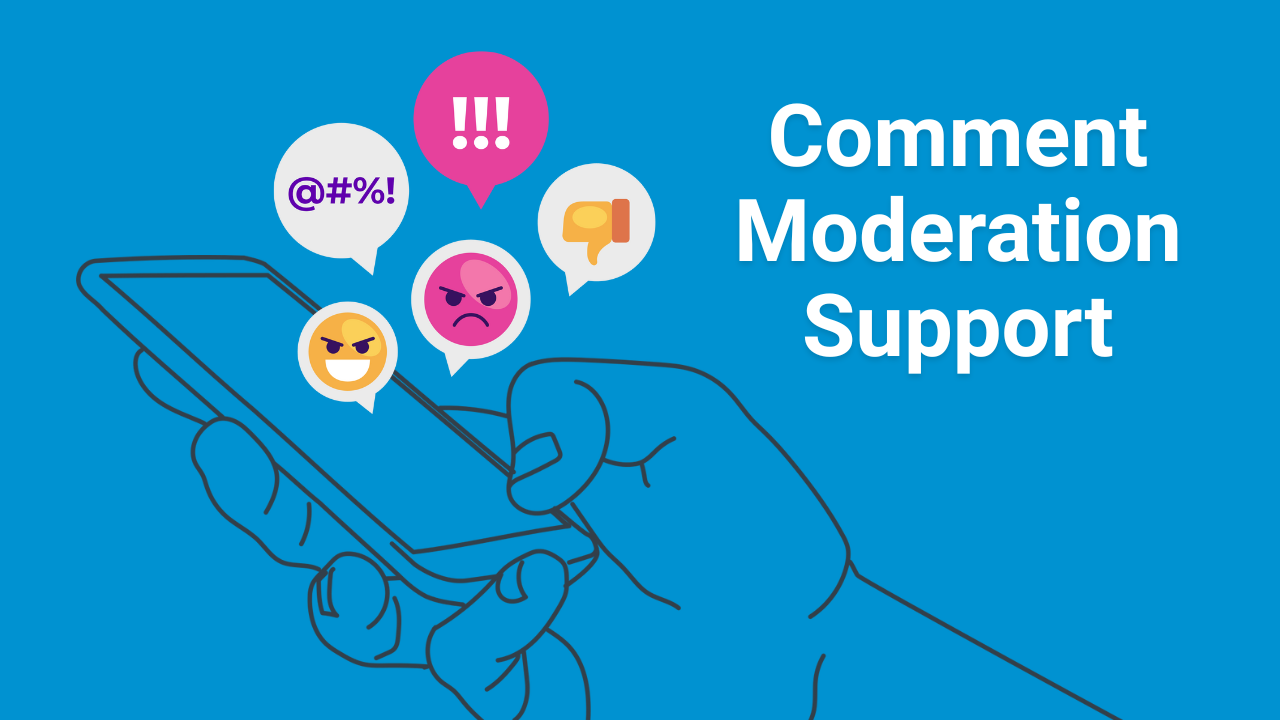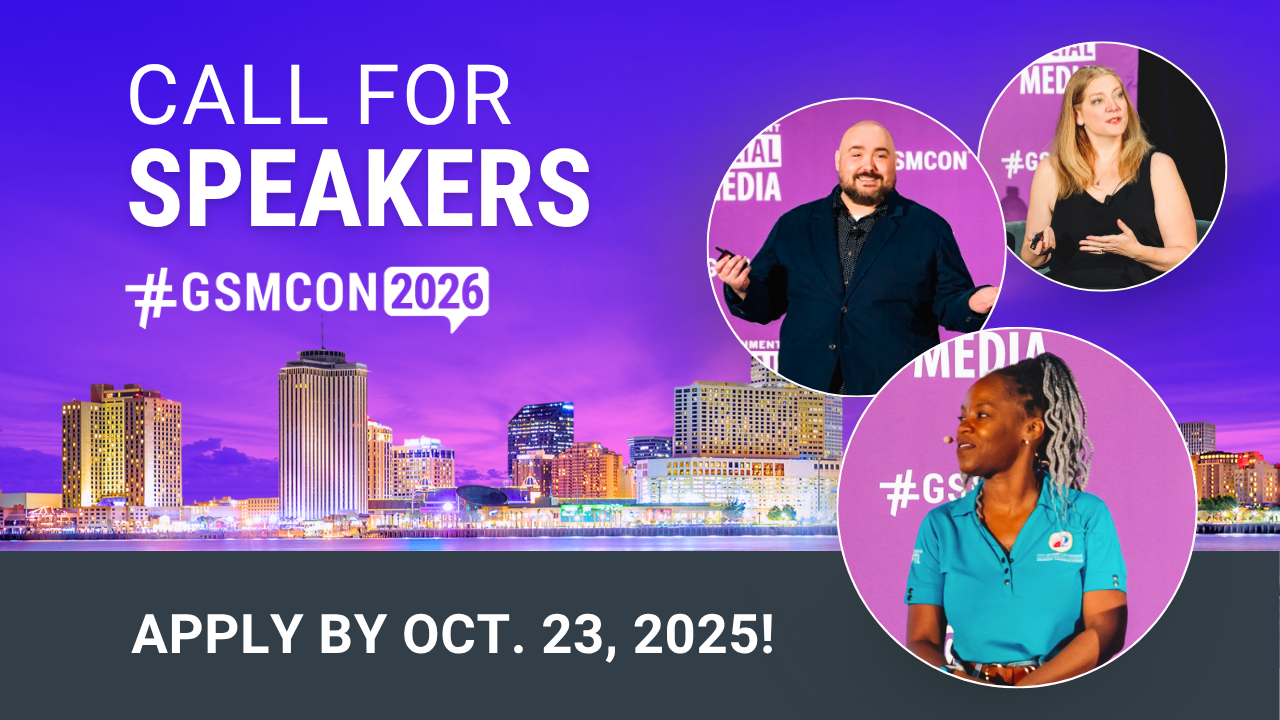
Comment moderation: Handling positive, neutral & negative
Sep 24, 2025Contributed blog by Natasha Shahani, Content Specialist, and Ariana Donley, Social Media Manager, at Government Social Media®
Please note this is not legal advice. We encourage all socialgovs to consult with their agency’s leadership and legal teams on creating guidelines and a social media policy that addresses comment moderation.
Reading the comment section on any post can leave you feeling like the emoji with heart eyes 😍 or the one with expletives on its mouth 🤬, and everything in between. No matter the reaction, comment moderation comes with the territory of being a socialgov and it’s more than just a box to check.
Done well, comment moderation can humanize your agency’s presence, build trust, and even stop the spread of misinformation. From connecting with your audience and providing customer service to addressing tough topics, thoughtful moderation shows your community that real people are behind the screen. It helps people trust your pages and your agency.
But, comment moderation isn’t just responding in the moment—it’s about having a clear plan. Here are a few guidelines to help get started:
But first, let’s talk about how the First Amendment applies to comments
From time to time, you may face pressure from administrators or other department heads to delete or hide specific comments (or close the comment section completely on certain posts). Since social media is designed to be an open forum, it's generally best practice to leave your comments on.
In past GSM training events with legal experts, the guidance has been against turning comments off on a post-by-post basis due to the risk violating the First Amendment, which protects freedom of speech in the United States. Most forms of speech are protected by this amendment, but here are some examples of speech that generally isn’t protected.
Work closely with your agency’s legal counsel to develop a social media moderation policy that’s in line with First Amendment protections.
Failing to uphold First Amendment protections could result in expensive legal battles that could leave your agency (and you, personally) vulnerable.
Comment moderation guide + dealing with negativity
Separating comments into categories can help set up a consistent approach to moderation. Most comments fall into three broad categories:
- Positive
- Neutral
- Negative
Here are some strategies that work well for socialgovs dealing with an influx of negative comments:
- Prioritize responses to disinformation first, then move onto those asking a direct question.
- Prepare as a team. Work with your communications staff to draft response templates in advance. That way, everyone is on the same page and you’re ready when tensions rise.
- Respond in a timely manner. Even a quick acknowledgment goes a long way. If comments come in during “off hours,” consider auto-responses that share operating hours or point people to FAQs.
- Know when to move offline. Complex or sensitive conversations are often best handled through direct messages, email, or a phone call.
- Maintain a calm, professional tone (even if commenters don’t). Avoid sarcasm and defensiveness.
- Don’t feel obligated to respond to every negative comment. Pinning a post or comment can help you address valid points more quickly, without derailing the overall conversation.
- Spot the patterns. Track recurring themes to help guide future messaging.
- Lean on the BIFF framework - Brief, Informative, Friendly, and Firm. It’s an easy reminder to keep responses short, factual, and respectful, especially in heated moments.
Every agency is different, so this framework isn’t one-size-fits-all. For example, here’s a sample process that can be shared amongst team members to stay consistent:
- “Like” positive comments or feedback.
- Only respond to neutral comments when there’s a question that can be answered or passed along to be responded to.
- Address a negative comment if able to provide resources or share it with the appropriate team. If the same person continues to comment to generate a negative response from the agency, there is no need to continue the dialogue.
- Ignore all spam messages.
Reminder: Always develop guidelines in consultation with your leadership and legal counsel.
Negative comments are bound to happen. But, a thoughtful approach can keep the conversation from spiraling while showing your community you’re listening.
What if a comment falls into a ‘grey area’? Some comments don’t fit neatly into categories. Maybe it’s hateful speech, a personnel matter, or a personal attack on someone in your post. These grey areas are where you should immediately bring in senior staff or your agency’s legal team.
Buffer encourages creating “rules of conduct” that can be placed on your agency’s pages or incorporated into a social media policy, remember the First Amendment still protects a wide range of speech. While this won’t eliminate grey areas, it does set expectations for your community and provides a foundation for your team to reference.
Think about creating a guideline or flow chart to help you identify when to pass messages on to another department and when to get more senior staff involved.
It’s important to keep track of the comments you pass along to other teams as a follow-up may need to be provided back in the comment section. You may want to consider asking the person to send a direct message or an email to make it easier for follow-up. Some social media management tools allow you to assign tasks so nothing slipped through the cracks. That way, everyone could track what needed a follow-up and who was responsible.
Ask for help
As a socialgov, you’re your agency’s social media expert—but you don’t have to shoulder the responsibility alone. Comment moderation is a team effort. When things get complicated, seek guidance from your leadership and legal counsel.
While this blog can serve as a helpful starting point, the most important step is creating shared guidelines and a strong social media policy. With that foundation, you’ll be better prepared to navigate difficult situations, and even more confident in focusing on what matters most: connecting with your community.
Meet the Authors

Natasha Shahani
Content Specialist - Government Social Media LLC
With eight years of government social media experience, Natasha joined Team GSM In 2025. Natasha graduated from Chapman University with a bachelor's degree in public relations & advertising and a minor in English. She has worked in PR and social media since 2011 and is looking forward to supporting the socialgov community. Natasha is a proud member of Alpha Gamma Delta and serves on the Board of Trustees for the Alpha Gamma Delta Foundation. When she is not working or volunteering, she spends time with her daughter, adventures around LA and watches Hallmark movies.
Ariana Donley
Social Media Manager - Government Social Media LLC 
Ariana graduated from Southern Methodist University in Dallas, Texas with a B.A. in Journalism and a minor in Human Rights. She spent several years in the TV news industry and also served the Birmingham Police Department initially as a Crime Prevention Officer and later as the first Public Relations Manager. She is passionate about GSM's mission and and enjoys the positive and supportive team work environment.
Government Social Media® empowers government professionals to achieve mastery in social media through conferences, online training, and association membership. Best communicate with the public you serve and get connected with fellow socialgovs by registering for the 2026 Government Social Media Conference happening in New Orleans, LA and virtually from wherever you are! Join the free GSM Network for text-only chats on socialgov topics or access the Government Social Media Association (GSMA) for regional virtual meetups and educational webinars.








